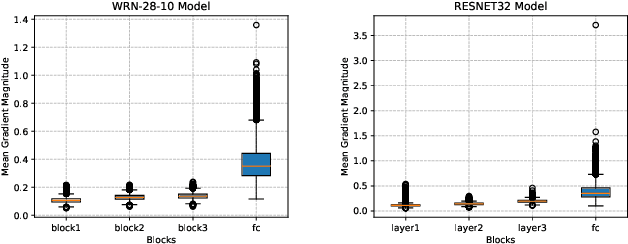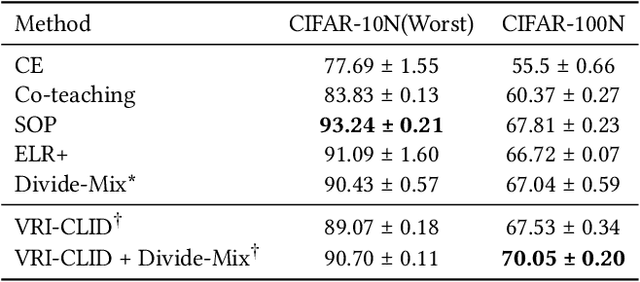Huayi Zhang
CLID-MU: Cross-Layer Information Divergence Based Meta Update Strategy for Learning with Noisy Labels
Jul 16, 2025



Abstract:Learning with noisy labels (LNL) is essential for training deep neural networks with imperfect data. Meta-learning approaches have achieved success by using a clean unbiased labeled set to train a robust model. However, this approach heavily depends on the availability of a clean labeled meta-dataset, which is difficult to obtain in practice. In this work, we thus tackle the challenge of meta-learning for noisy label scenarios without relying on a clean labeled dataset. Our approach leverages the data itself while bypassing the need for labels. Building on the insight that clean samples effectively preserve the consistency of related data structures across the last hidden and the final layer, whereas noisy samples disrupt this consistency, we design the Cross-layer Information Divergence-based Meta Update Strategy (CLID-MU). CLID-MU leverages the alignment of data structures across these diverse feature spaces to evaluate model performance and use this alignment to guide training. Experiments on benchmark datasets with varying amounts of labels under both synthetic and real-world noise demonstrate that CLID-MU outperforms state-of-the-art methods. The code is released at https://github.com/ruofanhu/CLID-MU.
ROSE: A Reward-Oriented Data Selection Framework for LLM Task-Specific Instruction Tuning
Dec 01, 2024



Abstract:Instruction tuning has underscored the significant potential of large language models (LLMs) in producing more human-controllable and effective outputs in various domains. In this work, we focus on the data selection problem for task-specific instruction tuning of LLMs. Prevailing methods primarily rely on the crafted similarity metrics to select training data that aligns with the test data distribution. The goal is to minimize instruction tuning loss on the test data, ultimately improving performance on the target task. However, it has been widely observed that instruction tuning loss (i.e., cross-entropy loss for next token prediction) in LLMs often fails to exhibit a monotonic relationship with actual task performance. This misalignment undermines the effectiveness of current data selection methods for task-specific instruction tuning. To address this issue, we introduce ROSE, a novel Reward-Oriented inStruction data sElection method which leverages pairwise preference loss as a reward signal to optimize data selection for task-specific instruction tuning. Specifically, ROSE adapts an influence formulation to approximate the influence of training data points relative to a few-shot preference validation set to select the most task-related training data points. Experimental results show that by selecting just 5% of the training data using ROSE, our approach can achieve competitive results compared to fine-tuning with the full training dataset, and it surpasses other state-of-the-art data selection methods for task-specific instruction tuning. Our qualitative analysis further confirms the robust generalizability of our method across multiple benchmark datasets and diverse model architectures.
UCE-FID: Using Large Unlabeled, Medium Crowdsourced-Labeled, and Small Expert-Labeled Tweets for Foodborne Illness Detection
Dec 02, 2023Abstract:Foodborne illnesses significantly impact public health. Deep learning surveillance applications using social media data aim to detect early warning signals. However, labeling foodborne illness-related tweets for model training requires extensive human resources, making it challenging to collect a sufficient number of high-quality labels for tweets within a limited budget. The severe class imbalance resulting from the scarcity of foodborne illness-related tweets among the vast volume of social media further exacerbates the problem. Classifiers trained on a class-imbalanced dataset are biased towards the majority class, making accurate detection difficult. To overcome these challenges, we propose EGAL, a deep learning framework for foodborne illness detection that uses small expert-labeled tweets augmented by crowdsourced-labeled and massive unlabeled data. Specifically, by leveraging tweets labeled by experts as a reward set, EGAL learns to assign a weight of zero to incorrectly labeled tweets to mitigate their negative influence. Other tweets receive proportionate weights to counter-balance the unbalanced class distribution. Extensive experiments on real-world \textit{TWEET-FID} data show that EGAL outperforms strong baseline models across different settings, including varying expert-labeled set sizes and class imbalance ratios. A case study on a multistate outbreak of Salmonella Typhimurium infection linked to packaged salad greens demonstrates how the trained model captures relevant tweets offering valuable outbreak insights. EGAL, funded by the U.S. Department of Agriculture (USDA), has the potential to be deployed for real-time analysis of tweet streaming, contributing to foodborne illness outbreak surveillance efforts.
 Add to Chrome
Add to Chrome Add to Firefox
Add to Firefox Add to Edge
Add to Edge